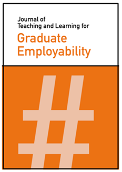The effects of trainers’ competence on employability of government polytechnic college graduates in Dire Dawa City, east-central Ethiopia
DOI:
https://doi.org/10.21153/jtlge2024vol15no1art1750Abstract
The need for competent and qualified trainers is of paramount importance for an effective technical training system that, in turn, helps to produce competent and employable graduates for the country’s economy. The purpose of this study is to investigate the effects of trainers' competence on the employability of polytechnic college graduates in Dire Dawa. The study employed a descriptive-correlational-explanatory research design with a quantitative research method. The sample for quantitative data consisted of 351 randomly selected graduates, trainees, trainers, and administrators. Both descriptive and inferential statistics were used to analyse the data. The findings revealed that trainers’ competence was positively correlated with graduates' employability. Specifically, predictors such as knowledge-related competence, assessment-related competence, skill-related competence, and managerial competence were found to have significant and positive effects on the employability of polytechnic college graduates in Dire Dawa. Therefore, the study recommends that the Dire Dawa city Labour Skill and Technology Development Bureau and Polytechnic colleges should give greater emphasis on improving trainers’ competence, which in turn enhances the employability of graduates.
References
Abdullah, Z., Hoque, K. E., Ramlan, N. H., & Shafee, S. (2019). Designing the Structural Model of TVET Lecturers’ Professionalism and Generic Skills Based on an Empirical Study in Malaysia. SAGE Open, 9(3), 1–18. https://doi.org/10.1177/2158244019861456
Ally, M. (2019). Competency profile of the digital and online teacher in future education. International Review of Research in Open and Distance Learning, 20(2), 302–318. https://doi.org/10.19173/irrodl.v20i2.4206
Almerich, G., Orellana, N., Suárez-Rodríguez, J., & Díaz-García, I. (2016). Teachers’ information and communication technology competences: A structural approach. Computers and Education, 100, 110–125. https://doi.org/10.1016/j.compedu.2016.05.002
Arifin, M. A., Rasdi, R. M., Anuar, M. A. M., & Omar, M. K. (2018). Competencies of vocational teacher: A personnel measurement framework. International Journal of Academic Research in Business and Social Sciences, 7, 147-164. http://dx.doi.org/10.6007/IJARBSS/v7-i14/3659
Boyatzis, R. (2008). Competencies in the 21st Century. Journal of Management Development, 27(1), 5-12. https://doi.org/10.1108/02621710810840730
Chen, Y. (2017). Graduate employability: The perspective of social network learning. Eurasia Journal of Mathematics, Science and Technology Education, 13(6), 2567-2580. https://doi.org/10.12973/eurasia.2017.01241a
Conrad, D., & Openo, J. (2018). Assessment strategies for online learning: Engagement and authenticity. AU Press. https://doi.org/10.15215/aupress/9781771992329.01
Dacre Pool, L. D., & Sewell, P. (2007). The key to employability: developing a practical model of graduate employability. Education and Training, 49(4), 277–289. https://doi.org/10.1108/00400910710754435
Fraser, C., Duignan, G., Stewart, D., & Rodrigues, A., (2019). Overt and covert: Strategies for building employability skills of vocational education graduates. Journal of Teaching and Learning for Graduate Employability, 10(1), 157–172. https://doi.org/10.21153/jtlge2019vol10no1art782
Geressu, B. S. (2017). Impact of Competence-Based Training on Employability of Technical and Vocational Graduates in Ethiopia. Tuning Journal for Higher Education, 5(1), 101-119. https://doi.org/10.18543/tjhe-5(1)-2017pp101-119
Giangrande, N., White, R.M., East, M., Jackson, R., Clarke, T., Coste, M.S., Penha-Lopes, G. (2019). A Competency Framework to Assess and Activate Education for Sustainable Development: Addressing the UN Sustainable Development Goals 4.7 Challenge. Sustainability, 11(10), 1-16. https://doi.org/10.3390/su11102832
Haddouchane, Z. A., Bakkali, S., Ajana, S., & Gassemi, K. (2017). The application of the competency-based approach to assess the training and employment adequacy problem. International Journal of Education, 5(1), 1-18. https://doi.org/10.5121/ije.2017.5101
Hosain, M.S., Mustafi, M.A., & Parvin, T. (2021). Factors affecting the employability of private university graduates: an exploratory study on Bangladeshi employers. PSU Research Review, 7(3), 163-184. https://doi.org/10.1108/prr-01-2021-0005
Ismail, A. Hassan, R., Abu Bakar, A., Hussin, H., Mat Hanafiah, M. A. & Asary, L. H. (2018). The Development of TVET Educator Competencies for Quality Educator. Journal of Technical Education and Training, 10(2), 38-48. https://doi.org/10.30880/jtet.2018.10.02.004
Ismail, K., Omar, M. K., & Abdullah, A. (2019). Professional Management Competency for TVET Teachers in Engineering Faculty at Vocational College. International Journal of Academic Research in Progressive Education and Development, 8(4), 33–46. http://dx.doi.org/10.6007/IJARPED/v8-i4/6433
Jafar, D.S., Saud, M.S., Hamid, M.Z., Suhairom, N., Hisham, M.H., & Zaid, Y.H. (2020). TVET Teacher Professional Competency Framework in Industry 4.0 Era. Universal Journal of Educational Research, 8(5), 1969-1979. https://doi.org/10.13189/ujer.2020.080534
Knight, P.T., & Yorke, M. (2003). Employability and Good Learning in Higher Education. Teaching in Higher Education, 8(1), 3-16. https://doi.org/10.1080/1356251032000052294
Koenen, A., Dochy, F., & Berghmans, I. (2015). A phenomenographic analysis of the implementation of competence-based education in higher education. Teaching and Teacher Education, 50, 1-12. https://doi.org/10.1016/j.tate.2015.04.001
Kothari, C.R. (2004). Research Methodology: Methods and Techniques. 2nd Edition, New Age International
Malm, B., & Löfgren, H. (2006). Teacher Competence and Students' Conflict Handling Strategies. Research in Education, 76(1), 62 - 73. https://doi.org/10.7227/RIE.76.6
McClelland, D.C. (1973). Testing for competence rather than for intelligence. American Psychologist, 28(1), 1-14. https://doi.org/10.1037/h0034092
Mulder, M., Weigel, T., & Collins, K. (2007). The concept of competence in the development of vocational education and training in selected EU member states: a critical analysis. Journal of Vocational Education & Training, 59(1), 67–88. https://doi.org/10.1080/13636820601145630
Omar, M.K, Zahar, F.N, & Rashid, A.M. (2020). Knowledge, skills, and attitudes as predictors in determining teachers’ competency in Malaysian TVET institutions. Universal Journal of Educational Research, 8(3C), 95– 104. https://doi.org/10.13189/ujer.2020.081612
Rofiq, Z., Surono, S., Bruri Triyono, M., & Setiyo Hari Purwoko, B. (2019). Developing the Standard Competencies for Vocational Teacher Candidates of Mechanical Engineering. Journal of Physics: Conference Series, 1273. https://doi.org/10.1088/1742-6596/1273/1/012032
Selvi, K. (2010). Teachers’ Competencies. Cultura International Journal of Philosophy of Culture and Axiology, 7(1), 167–175. https://doi.org/10.5840/cultura20107133
Sern, L. C., Hamisu, M., and Salleh, K. M. (2018). Determining the elements of TVET teachers competency for Nigerian higher learning institutions. Journal of Physics: Conference Series, 1049. https://doi.org/10.1088/1742-6596/1049/1/012078
Sulaiman, N.L., Salleh, K.M., Mohamad, M.M., & Sern, L.C. (2015). Technical and Vocational Education in Malaysia: Policy, Leadership, and Professional Growth on Malaysia Women. Asian Social Science, 11(24), 153-161. http://dx.doi.org/10.5539/ass.v11n24p153
Tippelt, R. and Amorós A. (2003). Competency Based Training compilation of seminar subject matter: training the trainers. 34 (d-nb.info)
Wagiran, P., Suyanto, W., Sofyan, H., Soenarto, S., & Yudantoko, A. (2019). Competencies of future vocational teachers: Perspective of in-service teachers and educational experts. Cakrawala Pendidikan, 38(2), 387-397. https://doi.org/10.21831/cp.v38i2.25393
Downloads
Published
Issue
Section
License
Copyright (c) 2024 Birhane Geressu, Zewdu Teshome Woldesemayat

This work is licensed under a Creative Commons Attribution-NonCommercial 4.0 International License.












